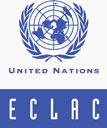Representatives from several Latin American and Caribbean (LAC) countries, European countries and the Economic Commission for Latin America and the Caribbean (ECLAC) met for a high-level roundtable on creating a regional compact on natural resource governance.
Alicia Bárcena, ECLAC Executive Secretary, said better governance and natural resource use are required to ensure a more diverse, environmentally sustainable economy.
 20 January 2015: Representatives from several Latin American and Caribbean (LAC) countries, European countries and the Economic Commission for Latin America and the Caribbean (ECLAC) met for a high-level roundtable on creating a regional compact on natural resource governance. Alicia Bárcena, ECLAC Executive Secretary, said better governance and natural resource use are required to ensure a more diverse, environmentally sustainable economy.
20 January 2015: Representatives from several Latin American and Caribbean (LAC) countries, European countries and the Economic Commission for Latin America and the Caribbean (ECLAC) met for a high-level roundtable on creating a regional compact on natural resource governance. Alicia Bárcena, ECLAC Executive Secretary, said better governance and natural resource use are required to ensure a more diverse, environmentally sustainable economy.
The roundtable, ‘Towards a LAC Vision on Natural Resources Governance for Equality,’ which took place on 19 January 2015, in Santiago, Chile, was organized by ECLAC in collaboration with Norway’s Ministry of Foreign Affairs.
Bárcena said ECLAC’s proposal for a regional compact aims to govern ownership, appropriation arrangements and the redistribution of productivity gains, to ensure that everyone benefits from the region’s natural resource endowments. She noted that some LAC countries are among the world’s primary producers of copper, iron, silver, molybdenum, lead and tin, and, in 2012, the LAC region had the world’s second largest tested oil reserves, after the Middle East. The region is home to a third of the earth’s freshwater reserves and 15% of the planet’s farmable land.
Highlighting her country’s experiences, Norway’s Ambassador in Chile, Hege Araldsen, said that in order for the population to benefit from natural resource exploitation, an inclusive and democratic system, robust and competent public institutions, and a society that controls its energy resources are critical.
During the roundtable, ECLAC emphasized elements necessary for a compact on natural resource governance, including: creating a long-term national policy and strategy to ensure that extraction industries contribute to development goals through diversification, structural change and social inclusion; updating countries’ tax frameworks to achieve greater progressivity; ensuring mechanisms are in place for the stabilization, saving and investment of income; and strengthening the capacity of public institutions to manage social, environmental and labor disputes related to the extraction sectors. [ECLAC Press Release] [ECLAC Executive Secretary Remarks]